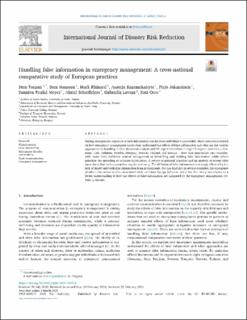| dc.contributor.author | Torpan, Sten | |
| dc.contributor.author | Hansson, Sten | |
| dc.contributor.author | Rhinard, Mark | |
| dc.contributor.author | Kazemekaityte, Austeja | |
| dc.contributor.author | Jukarainen, Pirjo | |
| dc.contributor.author | Meyer, Sunniva Frislid | |
| dc.contributor.author | Schieffelers, Abriel | |
| dc.contributor.author | Lovasz, Gabriella | |
| dc.contributor.author | Orru, Kati | |
| dc.coverage.spatial | Norway, Oslo | en_US |
| dc.date.accessioned | 2023-06-20T07:54:17Z | |
| dc.date.available | 2023-06-20T07:54:17Z | |
| dc.date.created | 2022-01-11T14:25:45Z | |
| dc.date.issued | 2021-03-02 | |
| dc.identifier.citation | International Journal of Disaster Risk Reduction. 2021, 57 1-9. | en_US |
| dc.identifier.issn | 2212-4209 | |
| dc.identifier.uri | https://hdl.handle.net/11250/3072208 | |
| dc.description | Sten Torpan, Sten Hansson, Mark Rhinard, Austeja Kazemekaityte, Pirjo Jukarainen, Sunniva Frislid Meyer, Abriel Schieffelers, Gabriella Lovasz, Kati Orru, Handling false information in emergency management: A cross-national comparative study of European practices, International Journal of Disaster Risk Reduction, Volume 57, 2021, 102151, ISSN 2212-4209, https://doi.org/10.1016/j.ijdrr.2021.102151 (https://www.sciencedirect.com/science/article/pii/S2212420921001175) | en_US |
| dc.description.abstract | During emergencies, exposure to false information can increase individual vulnerability. More research is needed on how emergency management institutions understand the effects of false information and what are the various approaches to handling it. Our document analysis and 95 expert interviews in eight European countries – Ger-many, Italy, Belgium, Sweden, Hungary, Norway, Finland, and Estonia – show that approaches vary consider-ably: some have instituted central management of identifying and tackling false information while others prioritise the spreading of accurate information. A review of national practices and an analysis of recent crisis cases show that both approaches may be necessary. The diffusion of false information is strongly affected by the lack of timely and verifiable information from governments. We also find that in several countries, the emergence of false information is often associated with malicious foreign influence activities. Our study contributes to a better understanding of how the effects of false information are mitigated by the emergency management sys-tems in Europe. | en_US |
| dc.language.iso | eng | en_US |
| dc.publisher | Elsevier | en_US |
| dc.rights | Attribution-NonCommercial-NoDerivatives 4.0 Internasjonal | * |
| dc.rights.uri | http://creativecommons.org/licenses/by-nc-nd/4.0/deed.no | * |
| dc.subject | Misinformation | en_US |
| dc.subject | False information | en_US |
| dc.subject | Information disorder | en_US |
| dc.subject | Vulnerability | en_US |
| dc.subject | Crisis communication | en_US |
| dc.subject | Emergency management | en_US |
| dc.title | Handling false information in emergency management: A cross-national comparative study of European practices | en_US |
| dc.type | Journal article | en_US |
| dc.type | Peer reviewed | en_US |
| dc.rights.holder | © 2021 The Author(s). Published by Elsevier Ltd | en_US |
| dc.source.articlenumber | 102151 | en_US |
| dc.description.version | publishedVersion | en_US |
| cristin.ispublished | true | |
| cristin.fulltext | original | |
| cristin.qualitycode | 1 | |
| dc.identifier.doi | 10.1016/j.ijdrr.2021.102151 | |
| dc.identifier.cristin | 1978470 | |
| dc.source.journal | International Journal of Disaster Risk Reduction | en_US |
| dc.source.volume | 57 | en_US |
| dc.source.issue | April 2021 | en_US |
| dc.source.pagenumber | 1-9 | en_US |
| dc.relation.project | EC/H2020/833496 | en_US |

